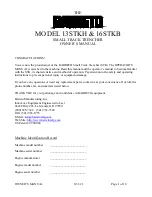
3 / SMALL GROUP HANDS-ON TRAINING AND APPLICATION PRACTICE
41
Start with the LUCAS device in the Carrying Case, next to the Brad manikin and ask for
a volunteer to perform manual CPR on the manikin:
1. Opens case; presses
ON/OFF
for one second to start self-test and power up the
LUCAS 3 chest compression system.
§
Key points:
Carrying Case was designed to be fast and easy to deploy.
To open, grab the zipper handles and unzip the case.
Make sure users see how the device is oriented in the bag, point out that the
charge port is facing down to ensure the device can be charged while in the case,
and where the
ON/OFF
button is located.
You’ll hear several tones when the device is turned on. These sounds are a self test.
Note: The LUCAS device powers down automatically after 5 minutes in the
ADJUST
mode.
2. Removes Back Plate from the case
3. Verbalises “stop manual CPR” to other rescuer
4. Places Back Plate under patient, immediately below patient’s armpits
§
Key points:
Reiterate the Back Plate can be oriented in either direction and the graphic is only
intended to provide a reminder of where to orient the Back Plate in relation to the
patient, and where to position the Piston and Suction Cup.
To place the Back Plate, you can either lift the patient’s torso and slide the Back
Plate under from the head or log-roll the patient and slide the Back Plate in from
the side.
‐
If using a Brad manikin (or comparable), demonstrate lifting the torso
Explain that an accurate position of the Back Plate makes it easier and faster to
position the Suction Cup correctly.
5. Verbalises “Resume manual CPR” to other rescuer
6. Lifts Upper Part of LUCAS 3 device from case and pulls once on the Release Rings
to check the claw locks are open, then lets go of Rings
Instructor Notes:
With users following along on the
User Performance Evaluation,
walk through each step
before doing a live action, full-speed demonstration.
Each numbered step below corresponds with a step in the
User Performance Evaluation.
Summary of Contents for LUCAS 3
Page 2: ...2 LUCAS 3 Chest Compression System Instructor Guidebook ...
Page 4: ......
Page 6: ......
Page 8: ......
Page 9: ...Chapter 1 Instructor Training Preparation ...
Page 10: ......
Page 14: ......
Page 15: ...Chapter 2 Classroom Training Introduction and Overview ...
Page 16: ......
Page 36: ......
Page 37: ...Chapter 3 Small Group Hands on Training and Application Practice ...
Page 38: ......
Page 47: ...3 SMALL GROUP HANDS ON TRAINING AND APPLICATION PRACTICE 47 ...
Page 48: ......
Page 49: ...Chapter 4 Training Evaluation ...
Page 50: ......
Page 52: ......
Page 53: ...Appendix A Important Contacts ...
Page 54: ......
Page 56: ......
Page 57: ...Appendix B Frequently Asked Questions ...
Page 58: ......
Page 66: ......
Page 67: ...Appendix C The LUCAS Device in the Cath Lab ...
Page 68: ......
Page 74: ......
Page 75: ...References ...
Page 76: ......
Page 79: ......
















































